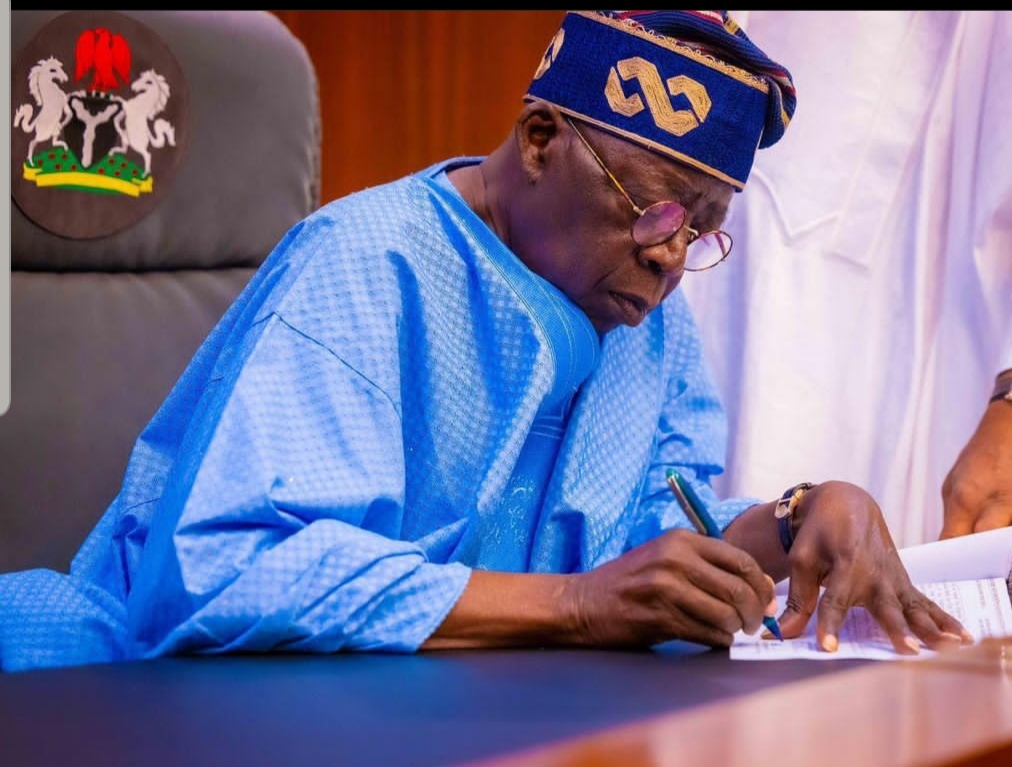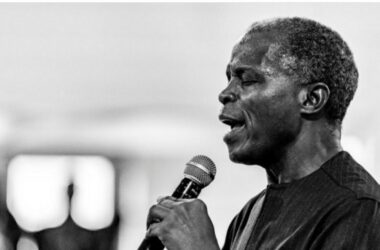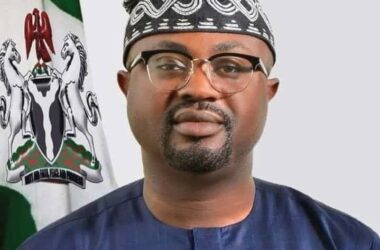Most of the time – whether in the lives of individuals, families, communities or nations – what we fear the most almost never comes to pass. No wonder the great American President, Franklin D. Roosevelt, upon coming to office in 1933 at the height of the Great Depression, told his anxious compatriots, “The only thing we have to fear is FEAR ITSELF.”
There is a lot of fear in Nigeria today – and the reasons are not hard to find. The country is in the grip of a multiplicity of crises – no thanks to a deadly cocktail of negative factors on the economic, social and security fronts, among them the decline in the price of crude oil (Nigeria’s economic mainstay) in the international market; oil theft, resulting in the country’s inability to meet its OPEC-imposed production quotas; a steep fall in the value of the country’s currency, the naira, against major world currencies; a rise in unemployment figures, especially among our youth population; two economic recessions within a period of five years; the adverse effects of the Covid 19 pandemic and the global lockdown it necessitated; and the war in Ukraine and its impact on global food security and key supply chains. Not to mention the exponential rise in deadly violence on the part of non-state actors – religious extremists, secessionist agitators, bandits, ritualists and killer-herdsmen, etc. In a nation constantly on edge, lurching from one self-inflicted crisis to another, and faced with the ever-present spectre of imminent implosion or disintegration, there is indeed much to fear.
During the campaigns leading up to the 2023 general elections, these fears were played up to a fever-pitch, especially in the run-up to the presidential polls. The electorate was inundated with doomsday predictions (a number of them in the guise of ‘prophecies’) about what would happen to Nigeria should Candidate A, B, C or D be elected President. On election day, while some voted their hopes, others voted their fears, while yet others – even before the election, and then in its aftermath – ‘voted’ with their feet, in an intensification of what has now become known as the ‘japa’ syndrome.
Before it ultimately prevailed at the end of that exercise, the Tinubu presidential campaign was not spared the worst of these apocalyptic predictions – as questions (or fears, more like) were raised about virtually every aspect of the personal profile and fortunes of Asiwaju Bola Ahmed Tinubu, as well as his physical, mental (and even moral) readiness for the rigour of governance.
Rather than allay these fears, his pronouncement on May 29, 2023, declaring the end of the fuel subsidy regime, and the repercussions thereof, only seemed to have confirmed them. However, in the days following that pronouncement, a new paradigm of political and economic management is slowly emerging as President Tinubu settles into his new role, and his government begins to take shape in terms of key personnel and policy direction. The unintended consequences of that inauguration-day pronouncement aside, the reaction to the President’s early moves, especially among critical stakeholders, has been a sense that stability is set to return in respect of key economic indicators.
In line with the Tinubu campaign manifesto – tagged ‘Renewed Hope‘ – which made it clear that his government’s drive for rapid GDP growth would be founded on sound and mutually complementary fiscal and monetary policies, the President, after embarking on the aforementioned subsidy removal, has now taken on the floatation of the Naira – a move which, expectedly, is already being greeted with both eager anticipation and apprehension, depending where one stood.
But what is naira floatation, what does it entail, and what are its likely consequences?
Among other things, the Tinubu administration has stated its determination to embark on a thorough review of Nigeria’s federal budgetary methodology, aimed at weaning the country off a budgetary mechanism based on the US dollar value of our oil revenues. The government intends to base it, instead, on the projected level of government spending in a manner that optimises growth and creates jobs – without causing high inflation. One of the most important components of this policy is, of course, revamping the exchange rate of the naira (considering its double-edged impact on the cost of imports, the competitiveness of our exports, and net capital inflows, etc). From all indications, President Tinubu intends to work with the Central Bank of Nigeria (CBN) to review and optimise the exchange rate regime in a manner that wards off the negative impact of the current, and highly ineffective, system (such as financial dislocation, currency speculation and arbitrage) in a bid to bring about a stronger, more stable naira built on a productive real economy. In this system, in other words, the currency’s exchange rate fluctuates FREELY in response to various economic factors such as inflation, interest rates, trade balances, and capital flows. As we speak, the CBN has directed Deposit Money Banks (DMBs) to eliminate the rate cap on the Nigerian naira, signaling the move towards floating the currency.
As regards the likely consequences of this policy, on the negative side, floating the naira would lead to increased exchange rate volatility, which has the potential to impact inflation and the country’s external debt obligations. Nigeria’s total public debt stock, as of March 2023, was N46. 25 trillion – excluding the estimated N27. 55 trillion ‘Ways and Means’ loans from the CBN. Besides, increased exchange rate volatility may lead to capital flight and reduced investor confidence, which could pose serious risks to the country’s financial stability.
But on the positive side, it has the potential to boost the country’s export competitiveness, attract foreign investment, adjust trade imbalances, and respond to shifts in global markets in a more effective and timely manner. When the naira is allowed to float freely, depreciating its value as a result, Nigerian goods and services will be relatively cheaper for international buyers. This can stimulate export-oriented industries, increase foreign exchange earnings, and potentially reduce the country’s over-dependence on oil exports. It would also encourage the much-talked-about diversification of the economy and help build a more sustainable and resilient economic structure.
Some may question: Why is this move necessary NOW? Well, it is no secret that in spite of being one of Africa’s largest economies, Nigeria has had a long history of grappling with currency stability and foreign exchange challenges. And over the years, government has employed various measures to manage the naira, including pegging it to a specific exchange rate. This, of course, has naturally created TWO exchange rates – the official one and the black market. The disparity between the two exchange rates has over the years provided an avenue for people with ready access to dollars – including senior bankers and top government officials, etc. – to buy it at the official rate and then resell it on the black market. It is a highly distorted system that has, in the process, created instant millionaires and even billionaires – people who make tons of money while doing absolutely nothing, thereby making nonsense of the honest endeavours of their more productive fellow citizens.
So the floatation policy is, in a nutshell, an idea whose time has come.
One thing is sure, though, amid the discourse (and inevitable debates) on the pros and cons of the floatation policy. Its impact on the lives and livelihoods of the general populace will be immensely devastating – at least in the short term. And if not well-thought-out and implemented, this negative impact could even be long-term, which would thereby normalize what ought to be a temporary state of affairs. Hand-in-hand with the implementation of this policy, therefore, analysts are calling on government to, as a matter of urgency, put in place a comprehensive slew of proactive, innovative and far-reaching reforms which will provide some sort of social safety net and targeted intervention programmes aimed at mitigating the impact of this policy, (as well as that of fuel subsidy removal) on the beleaguered citizens of this country.
So, here is a bucket-list of what government needs to do in this regard:
– Social Safety Nets & Welfare Programmes: Government must strengthen existing social safety net programs and/or introduce new ones to support vulnerable groups in our society.
– Price Control Mechanisms: Government should regulate prices on essential goods and services to prevent excessive price hikes resulting from the inevitable fluctuations in the exchange rate.
– Investment in Infrastructure.
– Skill Development & Job Creation: Government should prioritize skill development programmes, vocational training and entrepreneurship support. Very importantly, it should create an enabling environment for small and medium-sized enterprises (SMEs).
– Support for Agriculture: No more lip service! Government needs to give targeted support to the agricultural sector to enhance productivity, reduce reliance on imports, and stabilize food prices.
– Investor Confidence & Economic Reforms: We live in an increasingly interdependent world. This understanding should spur government to implement structural reforms that enhance transparency, reduce bureaucracy, and improve the ease of doing business to attract both domestic and foreign investment.
– Financial Inclusion & Access to Credit: A disproportionately large section of our populace is still unbanked. Government needs to facilitate access to financial services and credit and empowering individuals and businesses to navigate economic uncertainties.
– Qualitative and Accessible Education & Healthcare.
– Communication & Public Engagement: It was the English writer, William Wordsworth, who said, “A good strategy, without the means to communicate it effectively, is worth little in any enterprise.” So government needs to communicate its policies, strategies, and the reasons behind floating the currency, engaging with the public, providing information, and encouraging feedback to help manage expectations, address concerns, and build public trust.
But the reforms being advocated here are not limited to the creation of a social safety net, as laudable as that is. The stark truth is that the Nigerian enterprise, in all its totality, is in dire need of radical reform. Therefore any proposed reform agenda that does not have a direct – indeed FRONTAL – impact on the superstructure of the Nigerian state at both national and subnational levels, will have no meaning whatsoever; it would be as futile as papering over deep cracks in a concrete structure with cellotape, or constantly re-arranging the furniture and adornments in a skyscraper built on shifting sand.
First and foremost, President Tinubu needs to assemble a cabinet – of both the ministerial and ‘kitchen’ variety, that is truly star-studded – men and women of proven capacity, in terms of expertise and experience, armed with a clear-sighted vision and a pragmatic roadmap on how to actualize it, as well as transparent integrity and an unshakable fidelity to positive core values. These individuals must be driven by patriotism, a passion for the common good and an intense desire to leave a legacy of lasting value in the lives of their countrymen and women. As Chinua Achebe noted in his book, The Trouble with Nigeria, such individuals are at a premium in every society, but they do exist – and it is the responsibility of the leader desirous of etching his name in gold in the annals of his people to find and recruit them. Fortunately, Nigeria is brimming with such outstanding individuals, both at home and in the Diaspora, and from every imaginable background, so the President has a rich pool of talent to choose from. We must put firmly behind us our fatal attraction to mediocrity and venality, and our culture of inefficiency and impunity in the service of narrow interests such as tribe, religion and region.
This is not to discount the critical importance of the need for the right composition, in terms of geo-political balance, in the cabinet. However, the President must not make a fetish out of it, to the detriment of excellence and merit. His track record as Lagos State Governor gives much cause for confidence in this regard, as he was able to assemble a highly capable team to drive the transformation we see in that state today – including helping to elect able successors who have advanced his agenda and developmental template towards actualizing a state, and especially a megacity, that is a world-class business hub, as well as a livable and family-friendly urban community and cultural melting-pot. As an observer of the administration’s early days has said, Tinubu is not just building a government of national unity; he is building a government of national competence. If that paradigm of governance takes hold at the national level, it is not too much to expect that the sub-national constituents (states and LGAs) will follow suit, sooner or later.
Also, with the desire and ability to reward and promote excellence in the quest for positive outcomes must come an equally strong desire to sanction mediocrity and corruption – in some cases ‘with extreme prejudice’ (to use the military parlance). This will take guts in a country where these negative tendencies are rife and entrenched, and those who benefit from them have graduated from being a cult to a cabal. The time to retire these individuals and other dead-woods in the system – be they in khaki, or agbada – has come.
Much has been said about the need to cut down on the cost of governance in Nigeria – although, sadly, there’s been pretty little appetite for that among the political class. But it is an existential imperative at this point in time, and the President and his team must demonstrate that understanding by embracing lifestyles of frugality and modesty, devoid of the flamboyance and conspicuous consumption our leaders are usually known for – which is a major part of the negative stereotypes being peddled about Nigeria and its ‘ways’ in the eyes of the world. To this end, it has been suggested that incoming Ministers and other high-level appointees, upon being sworn into office and receiving their appointment letters, must also be made to sign resignation letters on the spot. This will make it easier for the President to dispense with their services if they fall short, either in terms of performance or moral failure – without having to worry about the political fallout.
So far, President Tinubu has shown the political will and the gumption to take tough decisions, and a capacity for decisive action. He will certainly need large doses of these attributes, as well as a crop of the best people Nigeria can offer, to embark on the task of shifting the needle of our developmental aspiration.
Of course, stability is not the same as growth, but the early actions and positions of the administration of Asiwaju Bola Ahmed Tinubu, GCFR, such as the abrogation of the fuel subsidy regime and the naira exchange floatation policy, are a prescription for the stabilization of the Nigerian economy. And if stability is achieved and sustainable over a reasonable period, then, surely, growth cannot be far behind.






